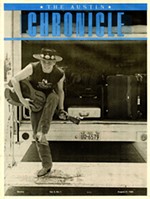Riding on the Wrong Side
By Lee Nichols, Fri., Oct. 17, 1997
The whole incident left him thinking: "If I was in an automobile, this never would have happened." Well, perhaps failure to show ID would have, although he says he would have had a driver's license on him if he drove a car. But would similarly minor traffic violations in an automobile have provoked such treatment? Houston doesn't think so.
"They're just harassing people on bicycles for who knows what... maybe that guy [the officer] just had a bad day," Houston says. "But just on civil rights grounds, it's a problem. Bicyclists are being singled out unfairly." Houston has since hired a lawyer to investigate the incident; he says he was also promised an internal affairs hearing, but, he says, he has yet to hear back from the police department.
Anyone who has ridden a bicycle for a while in our city will tell you: Motorists -- many of them, anyway -- don't give bicyclists the respect that they deserve. In this failure, they literally violate the law. According to Texas law, bicycles are considered legal street vehicles and, as long as they obey the same rules of the road (which isn't to say that they always do), bicycle riders have all the same rights and responsibilities as motorists.
Of course, it's up to the police to enforce this respect and protect bicyclists' lives. But are Austin's police doing it? It's difficult to quantify, but there is certainly a perception among many bicyclists that when it comes to bicyclist/motorist relations, the cops may be as prejudiced in favor of automobiles as anyone else.
This perception, right or wrong, appears to be widespread among local pedalers, and was only exacerbated by the (recently amended) helmet law. Talk to a biker, and if they don't have a tale of their own, they can quickly refer you to someone else who claims to have experienced harassment at the hands of Austin's law enforcement.
Patrick Goetz, an activist with the League of Bicycling Voters, told the city council in February: "I've heard versions of [Houston's] story from about five people first-hand, five others second-hand. In each case, a white male bicyclist between the ages of 20 and 30 is stopped by the police for not wearing a helmet. The individual is then searched and manhandled, and -- in the cases where he protests -- arrested and taken to jail. The reason given for the incarceration is always Failure to ID or Public Intoxication."
The police, naturally, don't necessarily see it the same way. Each incident detailed in this article was compiled and faxed to police spokesman Mike Burgess, who declined to comment on specific allegations concerning police conduct. Rather, he made the following blanket statement: "With bikers, like any other citizen, if they feel they were not treated properly they can contact the supervising officer or file a formal complaint. Any citizen has those opportunities."
Bicycling activist Tommy Eden claims to have experienced a particularly brazen example of police prejudice.
Riding at about the 3100 block of Guadalupe, Eden says a police car passed close enough to Eden to make him lose his balance. After catching up with the patrol vehicle farther down the Drag, Eden says, he chastized the officer.
"I said, `Officer, you should drive more carefully,' and he said, `Are you some kind of nut?' He said, `You shouldn't be on the street with that bike,' and said, `Go on, get off the street.'"
When the officer parked nearby, Eden says he got off his bike and confronted him. "I asked for his name and badge number, and he ignored me. I asked him again, and he turned around and arrested me. He put me up against the wall and then took me to jail. In the car, he asked me if I'm a nut again. He took me to jail and charged me with interfering with the duties of a police officer."
Eden eventually sued the city and the officer, but his only witness died before the case went to trial. Put in this situation, Eden settled out of court for $1,350. (The Chronicle was unsuccessful in trying to contact the officers in question for each of these incidents for this article).
These attitudes extend to cyclists' rights in general, according to Michael Zakes, the owner of Waterloo Cycles. "There is a business across the street from me [Austin Plasma Center], and there is a bike lane out front. [It's a no-parking bike lane, as opposed to the many bike lanes throughout Austin in which motorists can park.] Frequently, 18-wheelers park there for deliveries. I've called the cops about it, and then had the cops yell at me for calling them. They say they aren't doing anything wrong.
"If you call 911 to report being harassed [by motorists] on your bike, they blow you off, or send you to a different phone number. I've had it happen to me. Some high school kids harassed me, and I got the make and model and half of the license number [but nothing happens]. If I was a cop and had been shot, they'd bust their asses to catch them."
This perception of prejudicial attitudes took on an even deeper dimension with the helmet ordinance, which now applies only to minors. According to some activists, the ordinance became a tool for police harassment of cyclists.
The League of Bicycling Voters (LBV) says it tracked the results of the helmet ordinance using the police's own records, and came up with some startling statistics. The most alarming is one that could still be a problem under the revised law: As of August 22, according to the LBV, more than 70% of the citations issued to cyclists age 16 or under went to either Hispanic or African-American riders. (However, 74% of the violators over age 16 were white.)
LBV member Dale Johnson relates a tale that he claims illustrates the implications of this statistic: "Back when we were first starting out the petition drive against the helmet ordinance," Johnson says, "this one officer -- I wish I'd gotten his badge number -- said, `I like the law. On the Eastside, it gives me the opportunity to stop those young punks and frisk them.' He's one of the [cops] that we need to get rid of."
Austin Police Department spokesperson Burgess denies that the helmet law is used as a tool to target minority youths on the Eastside. "I'm not aware of that being the case," Burgess says. "The bicycle helmet ordinance is enforced the same as any other ordinance. If an officer sees the law being violated, they have discretion on how to handle it, and in terms of focussing on one specific group, that's something we would not do."
Surprisingly, the LBV statistic has been ignored. During the city council meeting in which the helmet ordinance was amended, councilmembers did not mention it in their deliberations, nor has the Austin American-Statesman brought it up.
As for APD's response to the LBV statistics, spokesperson Burgess says, "We would need more information to comment on that. We don't keep statistics on class C offenses." (According to Sledge, LBV member John Chaille compiled the stats using city databases. Chaille himself could not be reached at press time).
Protestors in the Critical Mass rides -- the illegal traffic jams periodically created by bikers at rush hour to protest car culture -- have complained of police harassment since day one. Of course, police -- as well as frustrated motorists and some other bikers -- have complained of unruly conduct on the part of the Critical Mass riders as well. But some Critical Mass riders claim that officers assigned to these protests can get a bit overzealous in their attempts to maintain control. The riders complain that cops watch the bicyclists with a microscope, looking for any reason to make an arrest or file a ticket, with far more scrutiny than is generally applied to motorists.
|
|
But to further rub salt in the wound of Young's arrest, the police allegedly left his bicycle at the scene, and it was then stolen. When Young sued the city, a judge ruled that it wasn't the city's fault that police didn't safeguard the bike, or allow Young to do so.
Egan Jones claims to have twice experienced harassment on Critical Mass rides. The first time was after briefly leaning his bike against a curb while taking a rest. Jones claims that he asked a friend to hold the bike, but within seconds, a police officer snatched the bike out of the friend's hands and began hauling it off, telling Egan, "If you touch this bike, you're going to jail!" Egan says he was told the bike was being confiscated for "abandonment," but he later retreived it.
The second time, Egan was ticketed for cutting through a parking lot on his bicycle -- but, he says, he was actually walking through the lot holding his bike at his side. Egan claims that, despite being told this by "at least a dozen witnesses, including another cop," the officer at the scene ticketed Egan anyway.
Egan says he then tried to protest the ticket, but was told that no ticket had been filed. Egan claims he kept checking for several months to see if the ticket had been filed, and finally gave up. Then, almost year later, Egan was shocked to receive an arrest warrant in the mail. When Egan took the ticket to court, the officer didn't show up, he says, and the ticket was dismissed.
While these incidents may seem egregious, some of the critics of a perceived police prejudice say they don't believe that such incidents are typical of attitudes on the police force. The LBV's Johnson says, "Ninety-five percent of them are professional."
"There are good apples and bad," says Zakes. "But some are very anti-cyclist."
Sgt. Mike Nyert of the APD's bicycle patrol says that bikers' beliefs that the police are unfair is a misconception. "As an avid cyclist and being in charge of the bike division, I know that people in cars become impatient with both motorists and bicyclists, and unfortunately," he says, "we know who wins in an accident."
Still, bicyclist Bluejay is adamant that bias against bikers is more than mere perception, it's fact. "I've told the city council that this law [the helmet ordinance] gives cops an excuse to harass. They're much more likely to arrest a bicyclist than a motorist. I've never heard of a motorist being arrested for a minor traffic violation. I can't count the number of bikers who have been arrested."
Got something to say on the subject? Send a letter to the editor.









